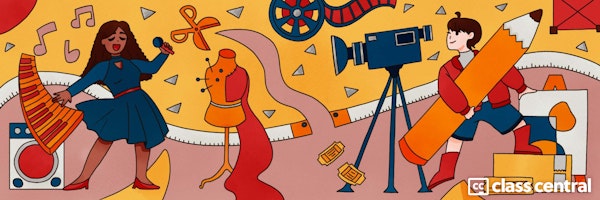
Piano Courses and Certifications
Learn Piano, earn certificates with paid and free online courses from Stanford, University of Michigan, Yale, Princeton and other top universities around the world. Read reviews to decide if a class is right for you.
Class Central's Top Piano Courses
We've picked the best online courses to learn Piano from the Class Central catalog.
Some courses are concise and get you up to speed in no time, others will be more comprehensive.
-

Beginner Piano Lessons
-
 MangoldProject
MangoldProjectPiano Lessons for Beginners
4 reviews -

Learn Piano! Play Songs, Chords, Scales and Learn About Music Theory, 18000 Piano Students!
-

Piano Lessons Year 1
-


Piano Techniques for Modern Music
-

Pianoforall - Incredible New Way To Learn Piano & Keyboard
-


Learn to Play Jazz Piano
-
 Pianote
PianoteEverything You Need to Know About Piano Chording
-
 Hoffman Academy
Hoffman AcademyBeginning Piano Unit 1
-
 Curtis Institute of Music
Curtis Institute of MusicExploring Beethoven’s Piano Sonatas
14 reviews
All Piano Courses
-
-
Level
-
Duration
-
Language
-
- Coursera
- 18 hours
- On-Demand
- Free Online Course (Audit)
-
- edX
- 10 weeks, 5-10 hours a week
- On-Demand
- Free Online Course (Audit)
-
- Coursera
- 12 hours 29 minutes
- On-Demand
- Free Online Course (Audit)
-
- Coursera
- 13 weeks, 3 hours a week
- On-Demand
- Paid Course
- 3 courses
-
- Coursera
- 10 hours 9 minutes
- On-Demand
- Free Online Course (Audit)
-
- Coursera
- 13 hours 1 minute
- On-Demand
- Free Online Course (Audit)
-
- Kadenze
- 30 hours
- On-Demand
- Free Online Course
-
- Coursera
- 12 hours 53 minutes
- On-Demand
- Free Online Course (Audit)
-
- Coursera
- 11 hours 42 minutes
- On-Demand
- Free Online Course (Audit)
-
- Coursera
- 8 hours 24 minutes
- On-Demand
- Free Online Course (Audit)
-
- Kadenze
- 50 hours
- On-Demand
- Free Online Course
-
- Udemy
- 1 day 14 hours 17 minutes
- On-Demand
- Paid Course
-
- Udemy
- 1 hour 3 minutes
- On-Demand
- Free Online Course
-
- Udemy
- 1 day 1 hour 23 minutes
- On-Demand
- Paid Course
-
- Udemy
- 9 hours 22 minutes
- On-Demand
- Paid Course
Frequently asked questions about Piano
Which one is easier to learn between a piano and a guitar?
It’s a matter of personal preference, and depends on how well you can pick up an instrument.
It is easier to begin learning piano and play a melody. Piano will play a clear note every time you press a key, hence, it is very easy to make the right sounds on a piano. Contrarily, playing a note on a guitar requires you to pluck and fret the string simultaneously, and needs practice to make the right sound. So guitar might be harder to start out with.
Unlike a piano, the guitar needs to be tuned before you play. You might end up with calloused fingers from playing a guitar. However, an acoustic piano is far costlier than a guitar, and also not portable, so you might have to settle for a cheaper digital piano if you’re low on budget.
Also, learning piano gets tougher over time, while with guitar, playing tends to get easier. But this is a debatable topic and solely depends on the student. Both are beautiful instruments and require lots of practice and dedication.
Can I learn a piano all by myself?
You can learn piano by yourself by taking online courses and referring to dependable sources. However, as a former piano student who learned from a professional, I would recommend joining physical piano classes and learning from a teacher. A lot of things need to be learned and corrected in person to master your skills, which may otherwise be incomplete if you are self-learning. From posture to techniques, piano is not just about reading the notes and pressing the keys, but mastering its intricacies and producing the best sound.
Can you learn piano on a keyboard?
When I joined my piano class, the first thing my teacher had said was to get a piano. Before that, I only had a keyboard and did not know the difference. Keyboards are apparently similar to pianos. But once you start learning, you’ll find that the key weights differ a lot. And your finger strength depends on it. Keyboards cannot suffice that, and will negatively affect your skills.
Pedals are another difference. Basically, keyboards and pianos are built differently for different purposes. However, considering the high cost of acoustic pianos, I had to settle for a digital piano, even though my teacher still insisted on getting an acoustic one because my finger strength was lacking. But if you’re only learning for fun and want to play simple melodies, you can use your keyboard. Otherwise, it’s best to play an acoustic piano.
Is piano hard to learn?
As a former piano student, I would say yes and no. “Yes” because, honestly, it requires a lot of practice and dedication, especially when you go to higher levels. Training your fingers takes time and a good teacher. Luckily, “no” because if you fall in love with the instrument, you would automatically want to challenge your limits and improve. Everything depends on how well you pick up the instrument. Patience and practice are everything. And it’s true for any musical instrument.












